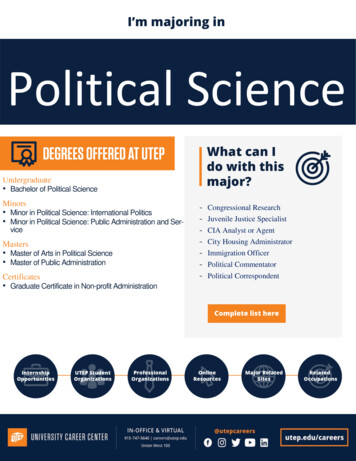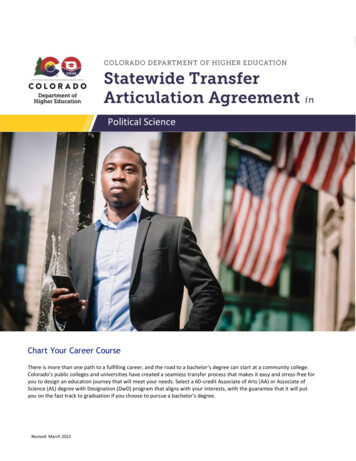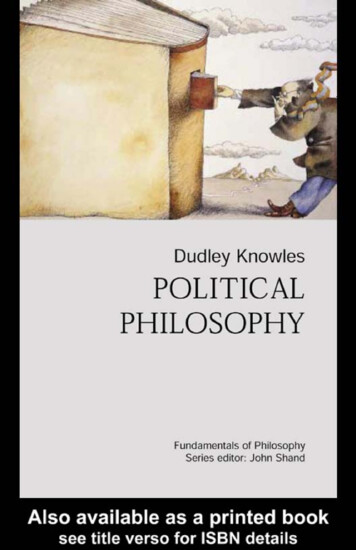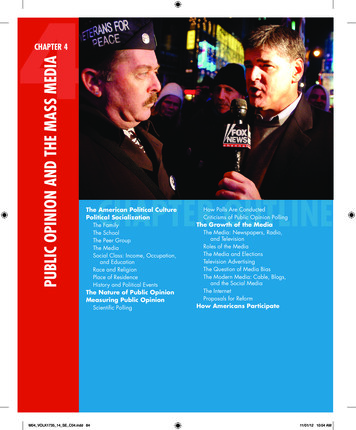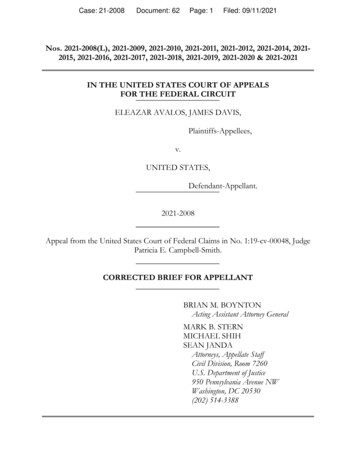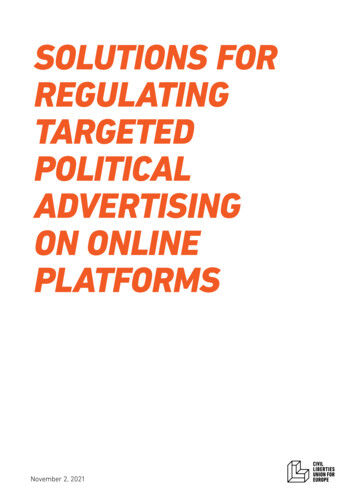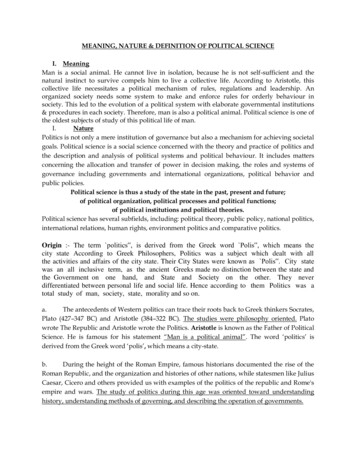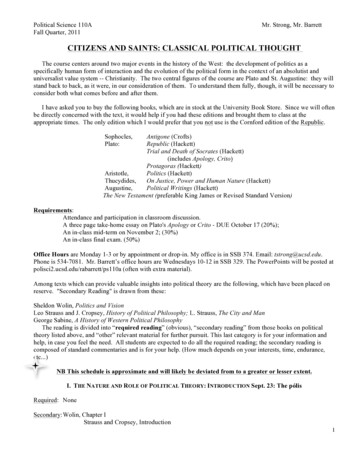
Transcription
Political Activities and the Hatch ActOFFICE OF LEGAL COUNSEL, OFFICE OF THE SOLICITOR, UNITED STATES DEPARTMENT OF LABORThe principle behind the rules on political activities is generally the same as with other outsideactivities: you should not mix your duties to the Government with your personal activities,including partisan political activities.The rules on partisan political activities are intended to allow you to actively participate in thepolitical process without being subject to coercion by any other federal employee. Mostemployees may engage in a wide range of partisan political activities during off-duty hours,while outside of federal property, and while not using any federally-issued equipment orresources.This document is intended to serve as guidance. It is not a substitute for formal ethics advicefrom the Solicitor’s Office (SOL). If you have specific questions, you should contact the SOLEthics Office. Contact information is provided below.What is Partisan Political Activity?Partisan Political Activity is specifically defined in the Hatch Act to include any activity directedtoward the success or failure of: a candidate for a partisan political office;a political party; ora partisan political group.A partisan political group is any organization that: is affiliated with a political party or candidate for partisan political office, (e.g., theDemocratic Congressional Campaign Committee);is organized for a partisan purpose (e.g., the National Federation of RepublicanWomen); orengages in partisan political activity (e.g., the Sierra Club Political Action Committee(PAC)).General Rules for Partisan Political Activity An employee may not engage in partisan political activity while on duty, in a federalworkplace, with the use of any federal resource (such as computers, cell phones,email, etc.), or while identified as a federal employee (such as while wearing a DOLlapel pin).An employee may never knowingly solicit, accept, or receive a political fundraisingcontribution.An employee may not run for partisan political office.Each of these bullet points is discussed in more detail below.Page 1 of 9
NOTE: Career members of the Senior Executive Service (SES), Administrative Law Judges(ALJ), and the Inspector General have significant limitations placed on their off-duty politicalactivities, as well as their on-duty conduct.NOTE: Employees who are appointed by the President with the advice and consent of the Senate(PAS officials) may engage in some on-duty political activities as long as the costs of suchactivities are not borne by the Government.Political FundraisingAs noted above, a federal employee, regardless of position, may not solicit, accept, or receivepartisan political contributions. For instance, federal employees are prohibited from: making telephone calls to solicit campaign contributions (including anonymouslyservicing a phone bank);forwarding, “liking”, or “favoriting” a solicitation for political contributions usingsocial media or email;hosting a political fundraiser;permitting the use of a Government title in connection with fundraising activities;serving on a political fundraising committee;personally handing out fliers containing fundraising requests; orasking for donations at a fundraising event.However, all federal employees may: attend a political fundraiser;make a political contribution; andRSVP as “attending” or “interested” in a fundraiser on social media.In addition, most federal employees (with the exception of career SES employees,Administrative Law Judges, and the Inspector General) may: stuff envelopes with requests for donations;solicit or accept political contributions from a fellow union member so long as thedonor is not a subordinate; anddonate one’s personal residence for a fundraising event and attend that event, providedthat the employee does not serve as the host or on a host committee; does not invitepeople to attend; and the invitation to the event does not identify the location of theevent by using the employee’s name (e.g., “at the home of ”).Running for OfficeA federal employee (including PAS officials) may not: run for a federal office (Congress);run for office as a candidate in a partisan election (i.e., an election in which candidatesare designated by party affiliation);Page 2 of 9
NOTE: In the Washington, D.C. area, federal employees may run as “independent” candidates inlocal partisan elections. An employee may also run for office in a nonpartisan election (i.e., anelection in which none of the candidates are designated by party affiliation).An employee must resign from their federal position before taking any action to run for partisanpolitical office. The Hatch Act has been interpreted to prohibit preliminary activities regardingcandidacy, therefore any action that can reasonably be construed as evidence that the individualis seeking support or undertaking an initial “campaign” to secure nomination or election wouldbe viewed as candidacy.Use of Government Resources for Political ActivitiesGovernment resources may not be used for partisan political activities.Government resources include: Government equipment, services, supplies, and mail;Government time;nonpublic information, including potential donor lists;a Government title;the authority of an employee’s official position.Services of SubordinatesSupervisory officials (career and noncareer) may not solicit, accept, or receive uncompensatedvolunteer services from a subordinate for any partisan political purposes. This is true even if theemployee’s offer is entirely voluntary and self-initiated.For example, a member of the Secretary’s staff may not volunteer directly to the Secretary towrite a speech for the Secretary’s use at a political event or to accompany the Secretary to thepolitical event to do advance work.Employees may, however, independently volunteer their services to a party or candidatecommittee to work at an event outside of duty hours and, in turn, be assigned at the discretion ofthe party or candidate committee to work with their official supervisor.Permissible or Prohibited Political Activities for MostEmployeesThe following are non-comprehensive lists of permissible and prohibited activities for mostfederal employees. For specific questions, contact the Counsel for Ethics. See the “EthicsContacts” section of this document.Permissible Activity Register and vote in an election.Be a candidate for public office in a nonpartisan election.Page 3 of 9
Assist in voter registration drives.Attend political fundraising events.Contribute to a political campaign or party.Campaign for or against candidates, referendum questions, constitutional amendments,or local ordinances.Sign and circulate nominating petitions.Deliver or write campaign speeches for candidates.Personally distribute campaign literature (except fundraising literature).Hold office in political clubs or political parties.Attend or serve as a delegate to a political caucus or convention.Stuff envelopes for a political party or candidate.Display a partisan political bumper sticker on a personal vehicle (unless the vehicle isused to conduct official business, such as inspections or other compliance activity).“Like,” “friend,” or “follow” a candidate on social media.Prohibited Activity Use Government resources, including supplies, time, title, or personnel for partisanpolitical activity.Engage in partisan political activity while on duty.Engage in partisan political activity in a Government office.Engage in partisan political activity while wearing an official uniform.Wear buttons or other merchandise with political/campaign slogans while on duty.Personally solicit, accept, or receive political contributions.Coerce other Federal employees regarding partisan political activities.Knowingly solicit or discourage the partisan political activity of persons with businessbefore their agencies.Be candidates for public office in partisan elections.Use official authority or influence to interfere with an election.Make partisan political remarks in the context of an official speech or other activity.“Like” or “favorite” a fundraising post on social media.Special Rules for Career Members of the Senior ExecutiveService, Administrative Law Judges, and the Inspector GeneralCertain federal employees who are considered “further restricted employees” under the HatchAct have more limitations placed on their political activities. In the Department of Labor, theseemployees include: career members of the Senior Executive Service (SES),individuals employed in the Office of the Inspector General, andAdministrative Law Judges (ALJ).In general, these employees are prohibited from engaging in partisan political management orpartisan political campaigns; i.e., they may not work on a campaign where any candidate isPage 4 of 9
running as the representative of a political party. In addition to the prohibitions listed above,further restricted employees should not: campaign for or against a candidate in a partisan election;circulate a nominating petition;distribute campaign literature;serve as an officer in a political party or as a delegate to a convention;speak on behalf of a candidate;organize campaign events;stuff envelopes for a political party or candidate; ormake telephone calls on behalf of a political party or campaign.However, further restricted employees may: vote;assist in nonpartisan voter registration drives;attend political fundraising events, rallies, or meetings;sign nominating positions;or contribute money to political parties or candidates.Special Rules for Political Activities of Presidential AppointeesSpecial Rules for Presidential AppointeesA Presidential Appointee in a position requiring Senate confirmation (PAS official) mustgenerally abide by the rules covering most federal employees.However, a PAS official may engage in partisan political activities: while on duty; andwhile on Government property.But may not: use Government funds or other resources for political activities; orask subordinate employees to engage in political activities as part of their Governmentduties.Special Situations for Employees Working with a Presidential AppointeeAlthough a PAS official may engage in partisan political activities during regular working hours,no similar rule covers other employees, including non-career SES and Schedule C employees.Non-PAS employees must abide by the general rules on political activities outlined aboveTherefore, while on duty or while in a Government office, a non-PAS employee may not: attend a political meeting;write a campaign speech;Page 5 of 9
perform advance work for a political event; orprovide advice regarding a political campaign.However, an employee who works for a PAS official may perform regular clerical andadministrative tasks in connection with the political activities of the PAS official (such asmaintaining the PAS official’s schedule), provided that such duties are part of normalGovernment duties of the employee and they are strictly limited to the logistics of getting theofficial safely and conveniently to the partisan political event. The employee may not beinvolved with any aspect of the planning for, or the content of, the partisan political event.An employee who works for a PAS official generally may not accompany the PAS official to apolitical activity or event held in a Government office or during the employee’s duty hours.However, an employee may accompany a PAS official on official travel to a political event if itis deemed necessary for the employee to perform necessary and incidental Department businessthat may arise during the travel or event. Thus, security personnel and a Government liaison mayaccompany a PAS official on a political trip. The non-PAS employee on official travel may notparticipate in, or assist the PAS official with, partisan political activities, even during non-dutyhours; the employee must limit activities to supporting the PAS official as an employee of theDepartment.Providing Briefing MaterialsA PAS official may ask an employee to provide them with publicly available, off-the-shelfmaterials, even though the senior official may be using them in connection with a politicalactivity or event.A PAS official may not request or require an employee to write or prepare any materials in afederal office and while on duty that will be used solely for political purposes nor may theyrequest the employee prepare materials containing statements of political advocacy.De Minimis ResourcesInfrequent de minimis use of some Government resources, i.e., local faxes and telephone calls,by PAS officials in connection with political activity is allowable under guidance issued by theOffice of Special Counsel. PAS officials are the only persons who may conduct politicalactivity during duty hours and inside of a federal building.Political TravelThe prohibition on the use of Government funds for political purposes also applies to travelexpenses of PAS officials and others attending partisan political events. For travel to purely political events, the political campaign for which the PAS official istraveling must make all the arrangements and pay all costs.For travel that includes both political and Government events, the campaign or politicalorganization must pay in advance a pro rata share of the costs based on the time spenton political activities.Page 6 of 9
For campaign events relating to a Presidential campaign, the campaign must pay thecosts which would have been accrued if the trip was solely for the Presidentialcampaign.For both exclusively political travel and mixed political/official travel, certainDepartment employees may accompany a PAS official on a trip to perform necessaryand incidental Department business, as noted above.Because the formulas for calculating costs associated with mixed trips are complicated and mayhave implications on federal election laws, employees involved in mixed trips (including thoseplanning the trips) should consult the Counsel for Ethics well in advance.Political RecommendationsGovernment officials with examining or appointing authority may not solicit, receive, orconsider an oral or written recommendation from a Member of Congress regarding an applicantfor a competitive service position, unless the recommendation is limited to the character orresidence of the applicant or unless it is based on the sender’s actual personal knowledge of theapplicant’s work performance and qualifications.This same rule applies to recommendations or statements from a Member of Congress regardingpersonnel actions for current Government employees, including promotions or disciplinaryactions.Employees who receive a recommendation letter from a Member of Congress should contact theCounsel for Ethics for advice on whether the letter may be considered when evaluating anapplicant or a current employee regarding a personnel action. This restriction in no waydisqualifies or prevents consideration of a particular candidate.Consideration of Other Ethics Laws and RegulationsEmployees must also be aware of and follow general ethics statutes and the Standards ofConduct while engaging in partisan political activity in addition to the specific rules governingpartisan political activities described in this document.General ethics rules cover: outside employment,financial conflicts of interest,appearances of impropriety,gifts,lobbying the Government, andmisuse of Government resources.For example, although a federal employee generally may serve as an officer of a politicalcampaign while off duty, they may not represent the campaign in a dispute before the FederalElection Commi
Certain federal employees who are considered "further restricted employees" under the Hatch Act have more limitations placed on their political activities. In the Department of Labor, these employees include: career members of the Senior Executive Service (SES), individuals employed in the Office of the Inspector General, and



